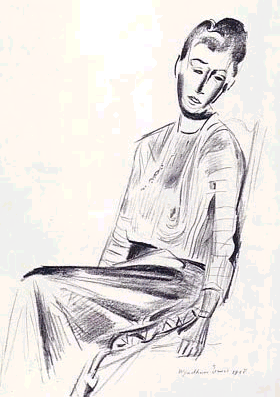
Sketch of Roberts by Wyndham Lewis, 1948
Lynette Roberts
Collected Poems
ed. Patrick McGuinness
Manchester: Carcanet, 2005.
Embrowns himmel hokushai. Manure seeps
In long rags, pavilions hut, camouflages
Arsenical veins with a sprouting
Febrifuge and serial of death; heaves a
Heavier heart of sedimentary hate.
Washing like flies to pin of elbow, soldiers
Under ciliated moon shake off floatings
Of soap; strike code on oxidised zinc; polish
Bayonets clean as the cut of the moon to
Sharpen inactivity. Spark electric cells
Of air into a prism of light as they
Shoulder the blades on parade. A shark wind teethes,
Strips fields; striating black fullstops under hedge;
Bellying-white trees as they stand caustic
And chagrin. Like paleozoic sentinels, stretched high
Above skeleton hills. Dripping rust low on
Blue lined eddies of wind, cold down
To the shafts of their root: to kerb of tide
Where cracked mud quails into Kuan glaze;
To greening dunes where rivulets shine as …
from Gods with Stainless Ears (opening of pt III p. 56)
McGuinness provides a fine introduction to this relatively unknown second-wave modernist (1909-1995) of Welsh descent, who grew up in Argentina & moved to Britain as a teenager, and who stopped writing poetry (partly due to hospitalizations for schizophrenia) in the mid-1950s. The collection consists of Roberts 1944 Faber & Faber collection (selected by T.S. Eliot), her 1951 Faber & Faber long war poem, Gods with Stainless Ears: An Heroic Poem, which McGuinness suggests is a kind of poetry screenplay, plus a miscellany of uncollected works. In a useful and detailed response to the book in the Boston Review, John Wilkinson links Roberts to second-wavers Mina Loy and Hart Crane. Comparison with David Jones is inevitable. Thick syntax, an often arcane lexicon, a complex prosody, and an aggressively off-center (not to say “minor”) perspectivism created a poetry of “sociolinguistic intensities,” in Wilkinson’s useful phrase.